CONNECT ALL STAKEHOLDERS IN ONE PLATFORM
AIRHART facilitates the sharing of insights and continuously develops as a learning system based on data.
CONNECT ALL STAKEHOLDERS IN ONE PLATFORM

- Insights
- Operational Flight Management
- Matching & Enrichment Engine (AODB)
- Community Enabled Libraries
- Core Data & Assets
- Integrations Framework
- Situational Awareness
- User Management
- Unified UI
- Basic Operational Features
- AI and Machine Learning
- Logic Flow
The whole foundation is extremely flexible and easily adapts to changing requirements.
AIRHART's Matching & Enrichment Engine constitutes traditional AODB Features
- Custom Data Management
- Flight Schedule Management
- Multi Airport Support
- Resource Management System
- Passenger Experience Management
- Turnaround Management
- Aeronautical Changes & Billing
- Commercial Management
- Information Display System
- Cargo Management
- IoT Management
- Inspections FOD
- Unified App
- Baggage Management
- 3rd Party Integrations
- Existing IT
- Custom Functionality
Multiple modules are currently under development with individual roadmaps aiming at release during 2021.
COMMERCIAL MODEL
AIRHART is delivered as a service - SaaS. It is consumption based, so you only pay for what you use.
Rather than paying a large upfront fee, airports can pay a monthly subscription and have access to the platform’s core features. This ensures:
- Transparency
- Simplicity
- Scalability
Modules are priced separately, allowing for airports to tailor a solution that fits their needs — scaling up, or down, as required.
What's more, the platform empowers airports to quickly and freely develop and deploy applications and integrations — there's nothing additional to purchase and no further infrastructure to roll out.
Contact Smarter Airports to learn more
Unified UI
The daily work of airport personnel is time-sensitive and has little room for error. Removing friction in daily work routines is essential for efficient and safe operations.
-
Key Functionality
AIRHART’s Unified UI ensures coherent and seamless user flows across the platform. The unified UI provides
single portal access ensuring fewer but better interaction principles. Furthermore the UI is customisable on
all levels, in that way optimising situational awareness for each user of the AIRHART
platform.
By making AIRHART’s features and modules available through a single Unified UI, daily
tasks and processes – such as manual flight updates or modifying core data assets – can be performed without
having to switch between applications.
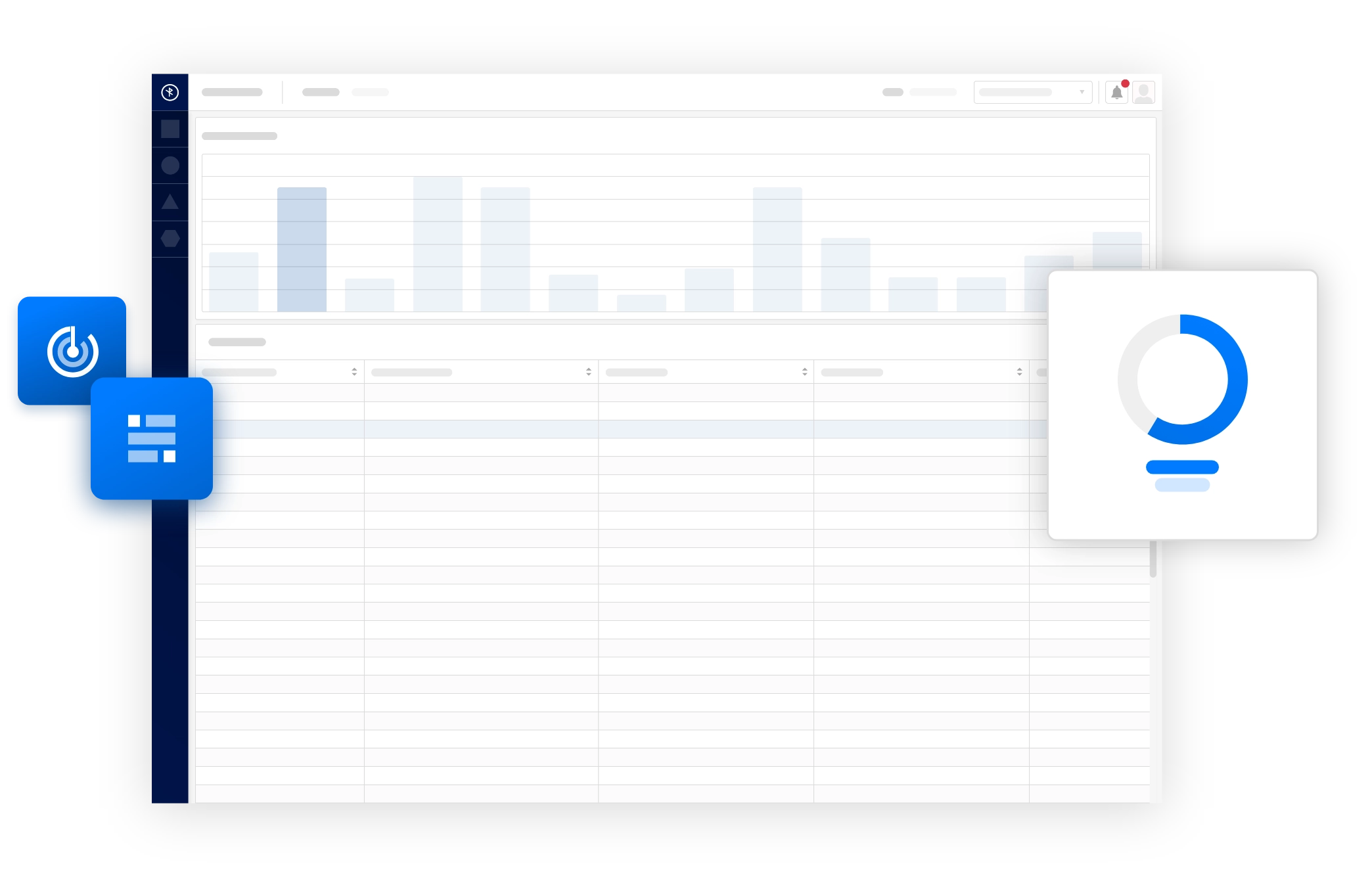
-
Benefits
- Configurable - AIRHART’s UI is built with a streamlined design system containing UI elements and frontend components.The components are highly configurable and can be tailored to fit a variety of contexts across the solution. To support the different needs airport stakeholder may have, the UI is highly customisable. Customisations can be applied across the entire airport, on role level or even down to the individual user.
- High performance - Furthermore, AIRHART is single-page application (SPA), where elements in the UI are dynamically rewritten instead of loading the entire page upon transitions. This optimizes the performance significantly and thus reduces friction in user flows.
- Easy to use - By re-using configurable components the end-user is presented with familiar interaction principles throughout the UI’s. This makes AIRHART easy to use and quick to learn.
INSPECTIONS & FOD
Some of the most important aspects of airports operations – such as safety, compliance, facility management - rely on the airport personnel’s ability to quickly report and handle incidents.
AIRHART’s Inspection module provides fast and easy flows for inspecting everything from approach lights, FOD and runway surfaces, to elevators, toilets, and FIDS monitors.
-
Key Functionality
- Configure your own inspection types (E.g. approach lights or toilets) and create custom registration steps for each
- Support of both ad-hoc incident reporting or scheduled inspections for individuals or in groups
- Mobile optimized user-experience via AIRHART’s Unified App
- Back-office module for supervisors and managers
- Deviation handling
- Reporting to authorities
- Special flows for FOD registrations
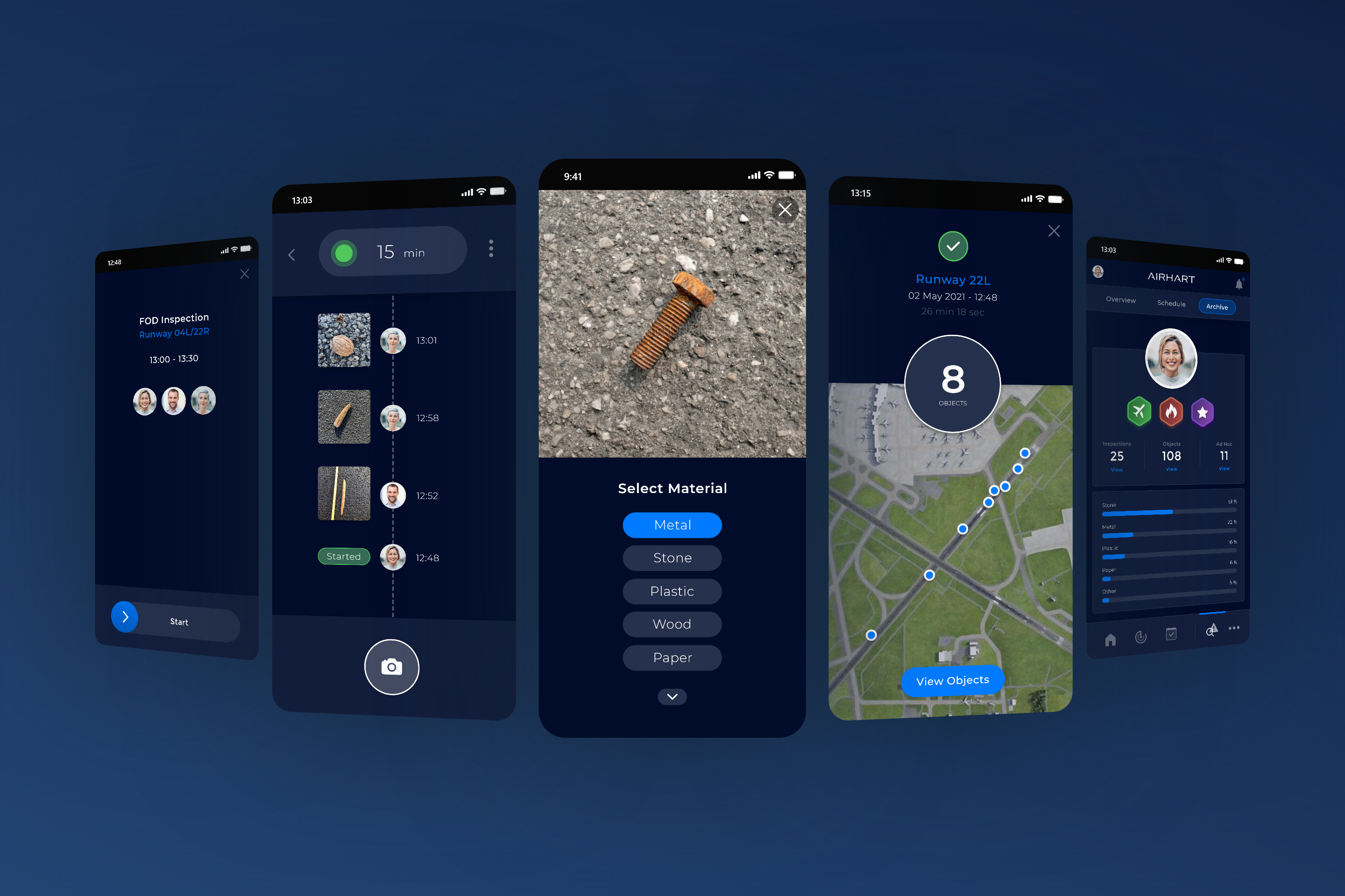
-
BENEFITS
- Faster and easier tools for registering incidents resulting in more incidents actually being registered and handled correctly.
- Context-specific user guidance for correct handling of special incidents – e.g. FOD that potentially could be an aircraft part.
- Leverage the power of data with automated processes where human input is only required for e.g. certain risk levels.
UNIFIED APP
Smart, safe, and efficient airport operations reach far beyond the limits of a desktop screen. Many of the most essential airport processes are carried out on-the-go. So, providing your staff with modern and efficient mobile tools is one of the most impactful investments you can make.
-
Key Functionality
The app is tailored specifically to fit your needs – either as an extension of the AIRHART airport management platform or as a stand-alone solution integrating with your current IT landscape. Similar to our Unified UI, the unified app allows airport personnel to access a wide range of mobile features and tools via a single app. The unified app is designed with scalability as a fundamental principle – ensuring that new features continuously can be added to the app.
The roadmap for the unified app includes features such as dashboards, alerts and notifications, flight list, A-CDM updates, tasks, incident overviews and Inspections & FOD.
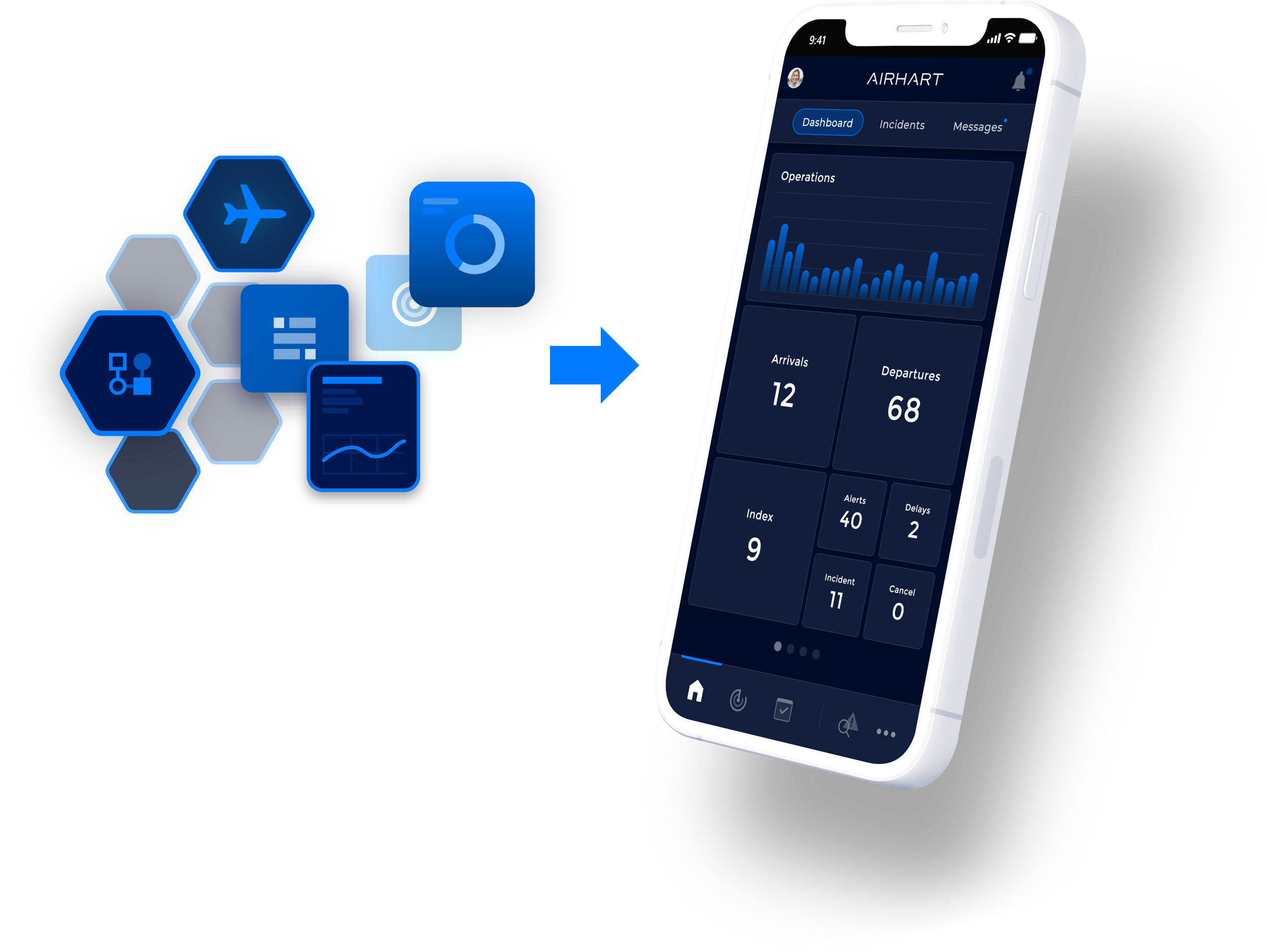
Mobile features give improved situational awareness and faster reaction time when deviations occur.
-
BENEFITS
- Increased efficiency for day-to-day tasks and processes
- Improved situational awareness and collaboration between stakeholders
- Better and faster tools for safety and compliance – e.g. FOD inspections
Matching & Enrichment Engine
The efficient and reliable operation of an airport depends on having common, comprehensive, and always up
to date operational data linked to specific flights.
The Matching & Enrichment Engine –
also known as Airport Operational Database (AODB) - gathers, prioritises, and enriches data from
different sources — providing various stakeholders with the most relevant and reliable data in real-time
- ensuring a single source of truth.
-
Key Functionality
- Flexible and automatic matching of messages from multiple sources and combined to a single source of truth
- Flights and other operational data are gathered from a variety of sources, including integrations to legacy systems, and matched and enriched with core operational asset data.
- Process and prioritise data through centralised and fully customisable business rules — bespoke to your operations.
- Verify your business rules before deployment, to ensure maximum efficiency and accuracy. Modify your business rules at runtime, with easy management and complete control - independent of IT development resources.
- Flex the database’s architecture to suit your needs — deploy specific data models, input varying source integrations, and set the rules that work for you.
- Adapt the AODB’s schema model, to accommodate data from new input sources and for output to new consumers.
- Built-in flight linking capabilities and a plugin model allows extending the Matching & Enrichment Engine with new capabilities.
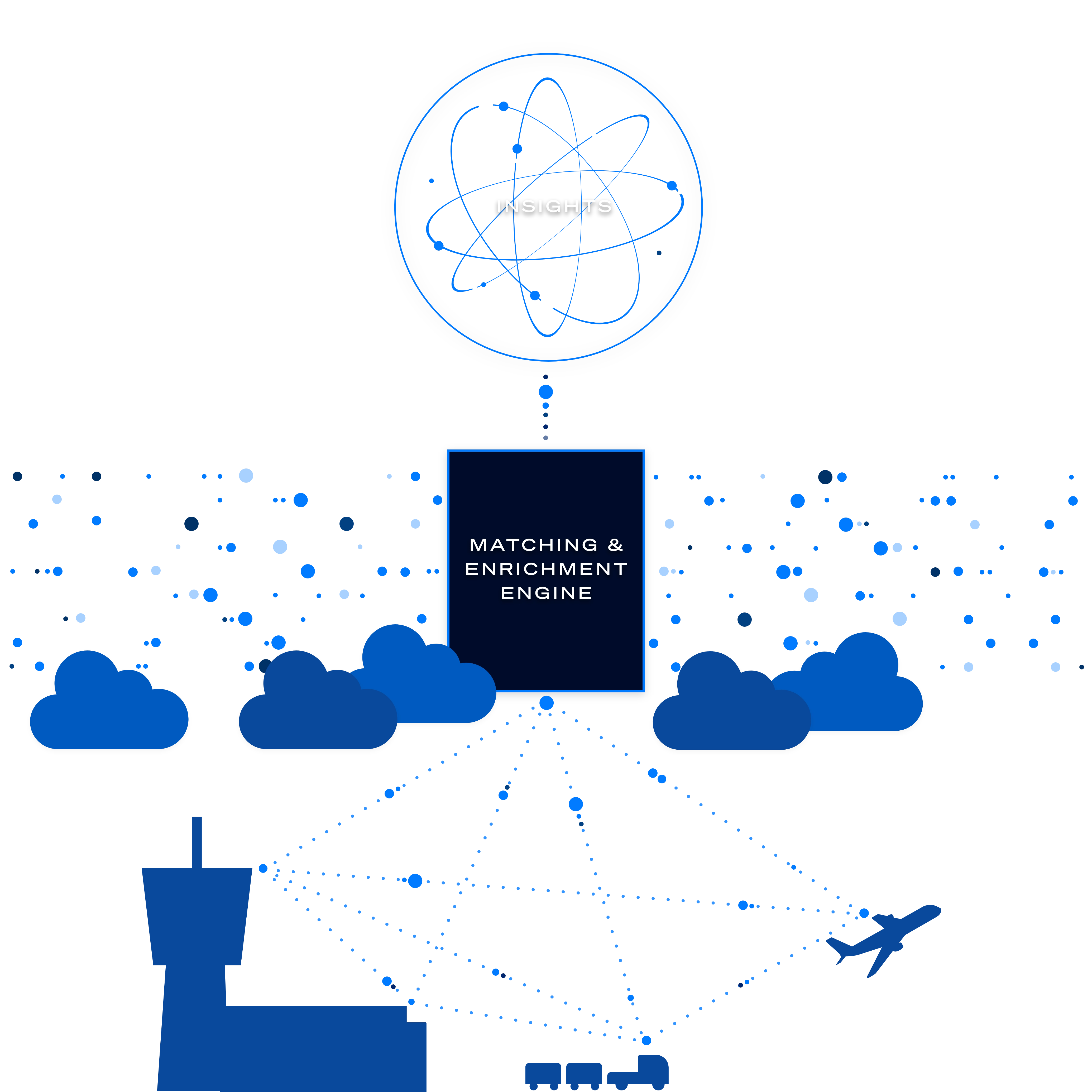
-
Benefits
- Data is sourced from different sources, aggregated, and prioritised to ensure a single source of truth for all stakeholders.
- Fully customisable to the specific needs of the airport and integration to the Smarter Airports ecosystem.
- Business rules can easily be modified to adapt to a changing environment —independent of IT-development resources.
- Full control of customisations with minimal cost of maintenance.
Core Data & Assets
The AIRHART Core Data & Assets feature is part of the platform foundation and includes fundamental data necessary for the operation of an airport.
The feature is a flexible data repository, automatically enhanced with more data types, as modules are added to the platform.
Management of data entities is covered in the Custom Data Management module.
-
Key Functionality
- Defines AIRHART’s common data model
- Data foundation for all core features and AIRHART modules ensuring data consistency and validation
- Centralised updated data supporting all related features and modules in the most optimal way.
- Automatic distribution of data changes to all stakeholders.
- Interfaces for full data exposure with updates available to all third-party components.
-
Benefits
- Cost-effective data foundation for modules requiring no adjustments in integration.
- Non-redundant data.
- Flexible update and access rights.
Operational Flight Management
Continuously operating flights and adapting to unforeseen changes such as disruption or delays are at the core of airport operations.
AIRHART enables the overview and management of all flight records while providing a solid and automated solution to frequent repetitive operations such as flight disruptions. It is instrumental in reducing costs, improving customer experience, and enhancing safety.
-
Key Functionality
- Manage and store all flight records to ensure optimal planning and operation for all airport stakeholders.
- Highly customisable views allow users to choose and modify presented information, tailoring it exactly to their needs.
- Easy inline editing of fields allowing for easy and efficient workflows
- Continuous updating – automatically adding information as new data becomes available.
- Track all received remarks automatically, across different organisations, and for each flight record.
- Seamless management of all actions needed, from before arrival to after departure, by linking incoming and outgoing flights together.
- Prioritise your data sources, to ensure the most credible information is shown, and highlighting potential uncertainties in data quality.
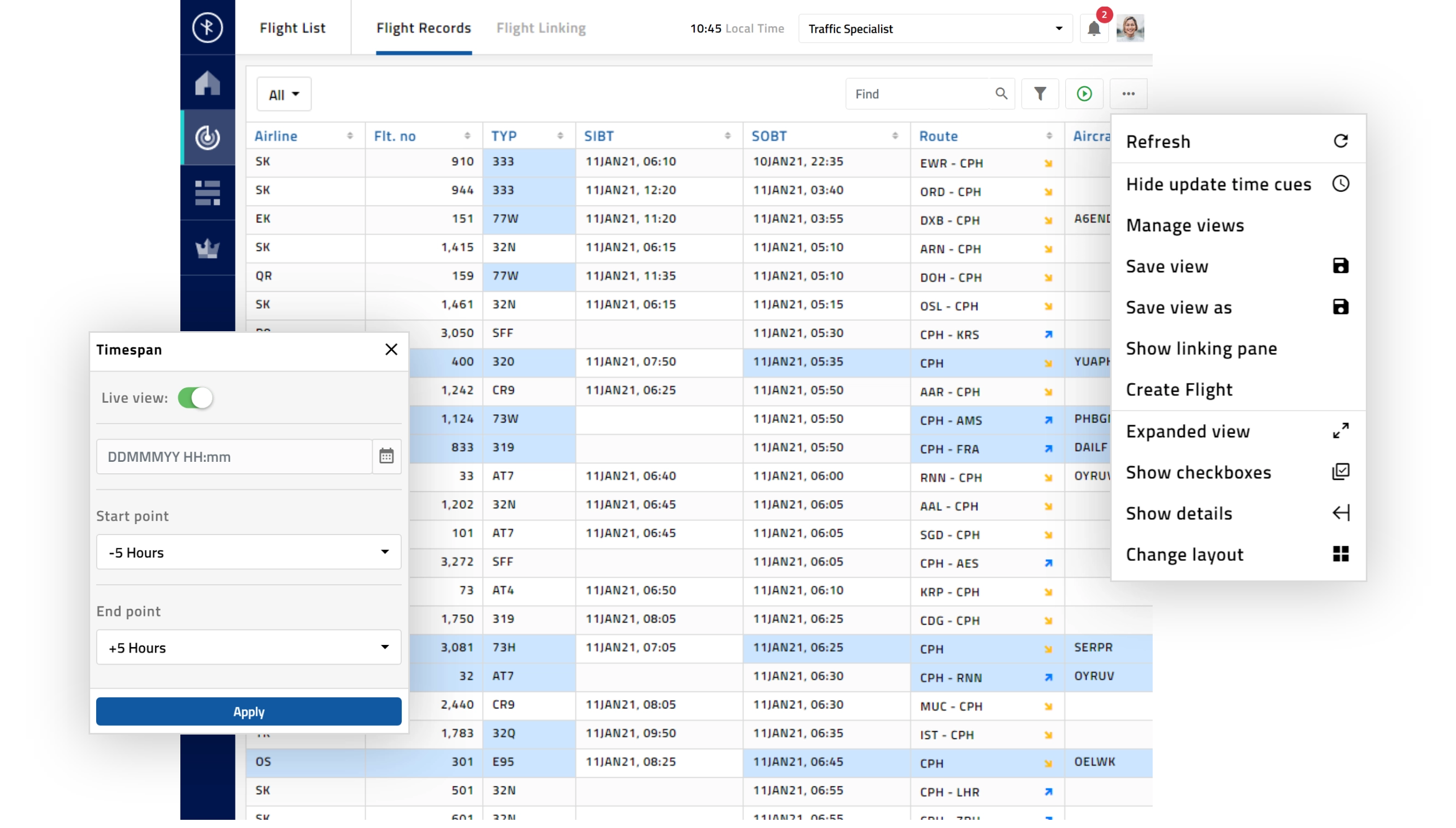
-
Benefits
The advanced Operational Flight Management feature provides business value from day one by:
- Increasing efficiency and quality of daily operations across the airport by providing a single source of truth.
- Ensuring the correctness of all data used and shown, through automatic data capture.
- Providing a single source of truth across multiple stakeholders to simplify cross-communication and planning.
- Allowing for the use of historic data to analyse and enhance processes and specific flights.
“AIRHART provides credible data allowing for early detection of potential operational disruptions and potential bottlenecks.”
Christian Poulsen
COO, Copenhagen Airports
Community Enabled Libraries
AIRHART connects airports and stakeholders across the ecosystem allowing for value creation based on data
and collaboration.
AIRHART fuels an open ecosystem and we welcome contributions,
applications, and integrations with third parties. APIs, data, processes, and widgets are shared online
among members of the AIRHART community. This allows for ease of use, a quick time to market and the
acceleration of digitalisation in the total airport management domain.
-
Key Functionality
- Share widgets, integration APIs and business processes among members in the AIRHART community.
- Re-use your best configurations in new contexts.
-
Benefits
- No need to start from scratch when integrating with new or existing functionality.
- Embrace agility and pursue new business and revenue streams.
- Short time to market allows for easy testing and proofing of new features.
Basic Operational Features
AIRHART supports all basic operational features needed to run an airport. These covers all basic functionality that does not justify a separate hexagon – for example;
- Management of time formats and time zones
- Personal preferences, such as night/day theme
- Keyboard shortcuts
User Management
Airports are powered by a wide range of teams, working simultaneously to keep operations running
smoothly. While some employees are focused on the air — tracking flights and organising the runway —
others are on the ground, loading cargo, transporting passengers and keeping everyone
safe.
With so many people involved in daily operations, user management becomes critical to
an airport’s success. Teams need the data that’s relevant for them, delivered at the time they need it.
And security is of utmost importance too — you don’t want business-critical, sensitive data falling into
the wrong hands.
The state-of-the-art role management and delegation feature in AIRHART
empowers fine-grained access control down to field level. End-users experience a seamless interaction
with the platform through personalised content, while the business rest assured that everyone has what
they need — and nothing they don’t.
-
Key Functionality
The AIRHART platform has been built to deliver dynamic federated management of users and roles, ensuring secure access throughout the platform.
- Trust in industry-leading security with a variety of user management tools supported.
- Enjoy seamless onboarding for all users and organizations.
- Sign into the platform smoothly and securely, with solution-wide Single Sign-On and customisable Multi Factor Authentication policies.
- Manage users inside your own IAM tool - and they will automatically be granted the correct roles in AIRHART.
- Unified authentication and authorization for 3rd party integrations based on industry-standard OAuth 2.0
- Adapt permission management model to allow for tailored access control.
- Delegate a subset of roles to individual organizations for assigning.
- Keep an automatic log of all operations and data changes for subsequent auditing.
- Share views and dashboards between roles and/or users.
-
Benefits
AIRHART’s approach to user management and security is based on a foundation of up-to-date industry standards and state-of-the-art customisation.
- User-friendly sign-in experience on all platforms.
- Reduce your risk of vulnerabilities, with automatic platform security updates in line with industry standards.
- Add and remove users in one centralised hub — the IAM/AD tool of the organization — and it will automatically synchronise
- Each organisation can choose the user management tool of their choice — one that fits into their available solutions (AD, IAM, Google)
- Everything you need, and nothing that you don’t. Tailor access to be specific for each airport, user organisation, role and ultimately the user
- Access control down to field level (lowest level / attribute level) ensures that you can never access sensitive information for other airlines.
Integrations Framework
Integrate to existing systems using a shared integration library, where high-quality, well-documented
APIs — the essential connectors of the AIRHART platform — are stored.
The Integrations
Framework feature enables users to both customise their workflows based on airport needs, and access a
stable foundation from domain standard integrations.
The Integration Framework is developed
continuously — with new integrations added to the shared integration library, as they become available.
-
Key Functionality
The Integrations Framework feature enables smooth integration with existing data providers and consumers.
- Quality, reliable and robustly tested integrations, designed specifically for the aeronautical domain.
- Handle data from and to multiple sources in various formats supported with high flexibility for custom needs.
- Full traceability of messages throughout the system enables insights into impact of information.
- High system availability made possible through fully scalable solution architecture
- Automated error-correction ensures high system resiliency.
-
Benefits
Get started with plug-and-play, standard integrations or build custom integrations with ease, thanks to:
- A palette of integrations for many domain standards e.g. SITA Type B messages.
- Integration bottleneck and unavailability detection and correction.
- Decreased back-office administration through automatic corrective measures.
- Fast time to market when new capabilities emerge, such as new integrations providing valuable data.
- Provides flexibility in support of custom needs and provides a stable foundation from domain standard integrations.
Situational Awareness
Reacting to changes in data and unexpected situations is a vital and crucial part of everyday work at an
airport. AIRHART enables situational awareness by allowing automated alerts to be raised on specific
requirements, visual cues to highlight problem areas, and dashboards to group data and give a better
overview.
AIRHART also offers the ability to customise and share both dashboards and
visual/audio cues, increasing the work performance of each individual employee. Moreover, AIRHART is
accessible on multiple platforms (mobile/tablet/CUTE).
-
Key Functionality
The AIRHART Situational Awareness feature enables each employee to customise the data that is important for their role — creating an interface that facilitate, and improves, their workflow:
- Increase workforce productivity, with custom dashboard views tailored to each employee’s workflow
- Create visual and audio cues to fit the specific data each employee is working with, strengthening awareness of specific situations.
- Flag issues and resolve them faster, using automated alerts bespoke to the employee.
- Create dashboards for overview of all available data; providing historical, real-time and future predictions to drive actions and decision making.
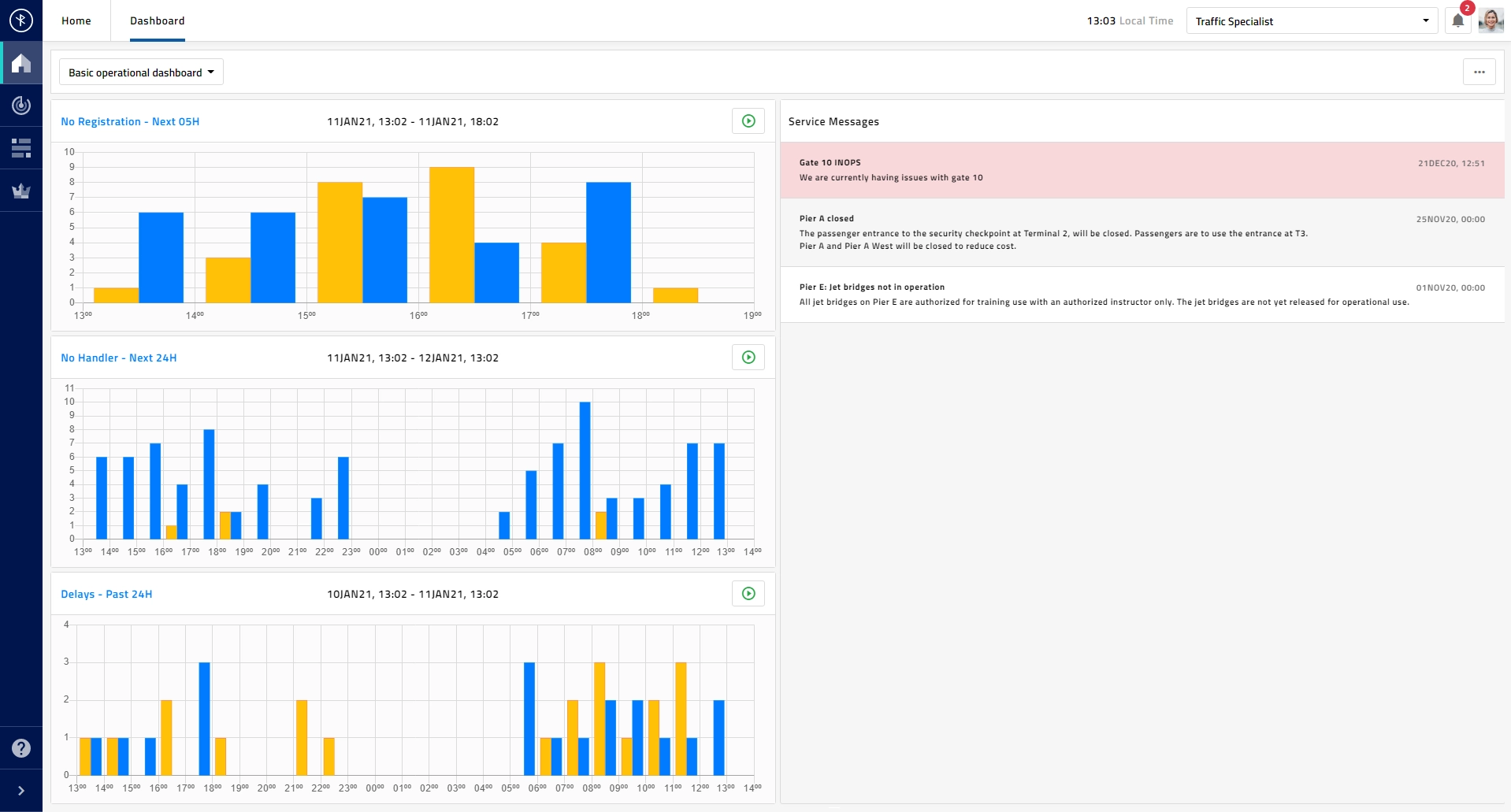
-
Benefits
- Significant improvement in error mitigation due to automated alerts and customisable visual cues.
- Scalable and role-based structure can enhance productivity across the organisation. Data views are customisable for employees to meet their individual needs.
- Visual cues and alerts can be created to handle future operational disruptions.
- The intuitive and user-friendly platform will provide efficient utilisation of investments and adoption. Quick learning curve means less time spent educating new employees.
- Fast response time to missing or changed data allows for better change in plans, and more time to adjust.
Machine Learning (AI/ML)
The aviation industry is facing the next technological revolution driven by AI/ML. AIRHART’s modern and flexible platform provides the technical foundation and agility needed to reap the benefits of smart airport operations driven by data – powered by AI/ML. The successful use of AI/ML technology requires certain steps to covered:
- Identify a business need with optimization potential based on experience and airport domain knowledge
- High quantity data is needed to train the AI model. Since AIRHART holds and maintains most airport data - high quality and all relevant contextual data sources are covered - this is unique to AIRHART compared to other AI/ML implementation projects
- AIRHART supports development and training of AI/ML models. During the training of the AI model, previously unseen patterns or business relations are detected – providing invaluable insights.
- The model is used repeatedly as part of the decision-making process, either to make an automated decision, or to offer guidance to human decision making
-
Key Functionality
- Get intelligent recommendations – e.g. recommendation of mitigating actions when alerts are raised or predicted
- Use dynamic values based on real-time contextual information
- Simulate operational scenarios to validate and improve business logic
-
Benefits
- Improve efficiency with smarter short- and long term planning based on forecasting
- Remove redundant workload from staff so they can focus on what matters
- Generate new revenues streams
- Improve passenger experience with less waiting and more accurate information display
- Improve turnaround time based on real-time analysis of ground handling sub-events
Logic Flow
In AIRHART it is possible to create logic flows separate of core business logic. This allows even non-technical users to create and modify logic flows to automate and optimize tasks throughout the airport value chain. Logic flows allows hypothesis-driven business development performed by those who knows the business-potential best.
AIRHART allows for all airport stakeholders to connect data and set up logic flows. Basically, logic flows consist of two components: triggers and actions. It is the combination of these that make up the logic flow.
What is a “trigger”? It can be anything from something as simple as “When flight SK123 is on block” or “When the bridge is connected on A21”, to something as complicated as “When the physical distancing indicator in a circular zone of 75 meter radius with centre at 12.34 latitude & 56.78 longitude is above 45 PDI”.
An “action”, can be anything as simple as “open the IoT-connected landside door in gate A21”, or simply “send a message to Airside Ops”, to something as complicated as “calculate alternative stand and gate allocation and send decision-suggestion to duty manager”
With these triggers and actions available each airport stakeholder, is enabled with a powerful tool to automate simple or more complex “logic flows” without engaging with the IT department or a 3rd party vendor. AIRHART has multiple logic flows available where users have created and published Logic Flows to provide several innovative use cases to automate operational tasks. Logic flows are shared throughout the AIRHART eco-system and even across airports.
-
Key Functionality
- User-friendly and simple configuration of logic flows
- Share logic flows across airports, large teams or hyper-locally to individuals
- Incorporate operational data, IoT devices or external sources
-
Benefits
- Instantly act on new opportunities to improve day-to-day tasks
- Test and try new logic flows with minimal disturbance of core business
- Automated and supported decision-making
- De-centralized value creation
New functionality under development
The AIRHART platform evolves continuously with new features and modules. The modules and core features follow individual roadmaps, designed to provide high quality and business-specific functionality. This allows airports to tailor the platform to fit their individual needs.
Reach out to us if you want to know more about a certain module or feature.
“We believe there is a strong desire by the players in the aviation industry to be released from old, locked legacy systems. The industry is looking for and moving towards agile, future-proof systems, based on open platform components that ensure full flexibility and opportunity for ongoing innovation.”
Mehdi Motaghiani
CEO, Smarter Airports
Multi Airport Support
AIRHART supports multi airport setups, allowing airport operators to maintain and share common data, business rules, billing etc across multiple airports in an intelligent and safe manner.
-
Key Functionality
AIRHART’s architectural design supports synergies between multiple airports within the same organisation. A
multi airport setup reduces the workload by creating and maintaining common aspects centrally – covering all
entities such as aircraft types or business processes such as billing.
To ensure effective
handling of a multi airport setup, entities that vary across airports can be extended to relate to the
airport to which this belongs. This also applies to roles, permissions and data scopes that span multiple
airports.
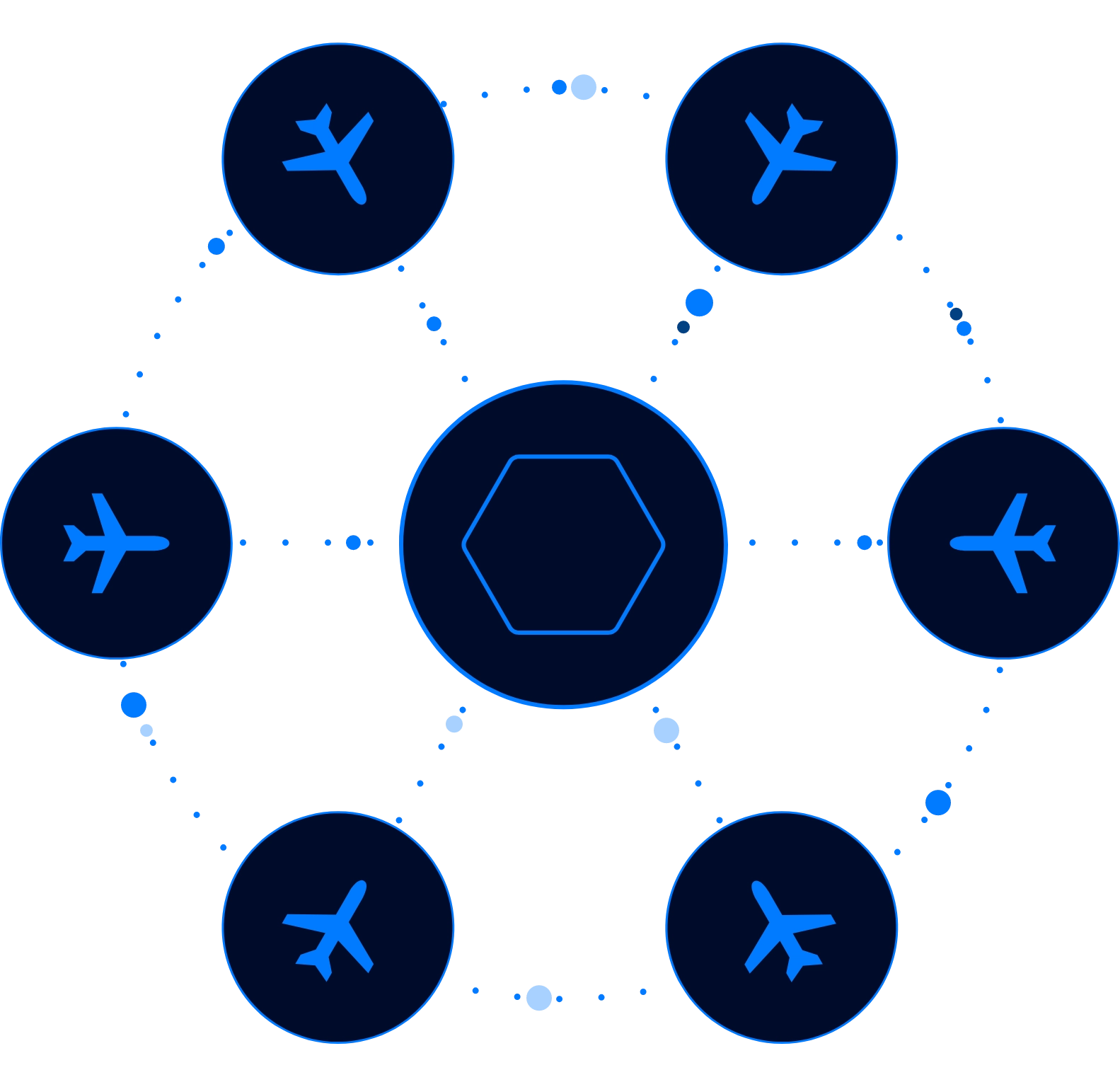
-
Benefits
- Multiple Airports share core data and assets
- Common business rules and business processes are created and maintained centrally
- Billing is handled across multiple airports
- Airport-specific aspects are effectively kept separate
- Dashboards can show data from one or multiple airports at once
- Roles can be configured with permissions and data scopes that span multiple airports
Flight Schedule Management
Planning of airport activities, and ultimately passenger forecasting, is key for raising efficiency, improving safety, reducing emissions, and controlling operational cost. The AIRHART Flight Schedule Management module allows for maximum resource utilisation across multiple planning scenarios.
-
Key Functionality
The Flight Schedule Management module enables smooth processing of flight schedules, making smarter schedule assessment and activation possible.
- Utilise a range of tools for assessment and planning of season flight schedules, prior to publication and distribution to all relevant parties.
- Compare schedules to determine the quality and reliability of each season; uncovering insights surrounding how one season differs from the previous season, or the season before that.
- Import and handle seasonal flight schedules from multiple sources in various formats.
- Edit the data directly in the user interface or define automated data conversions, allowing for fast conversion of multiple schedule entries.
- Automated error handling ensures high data quality.
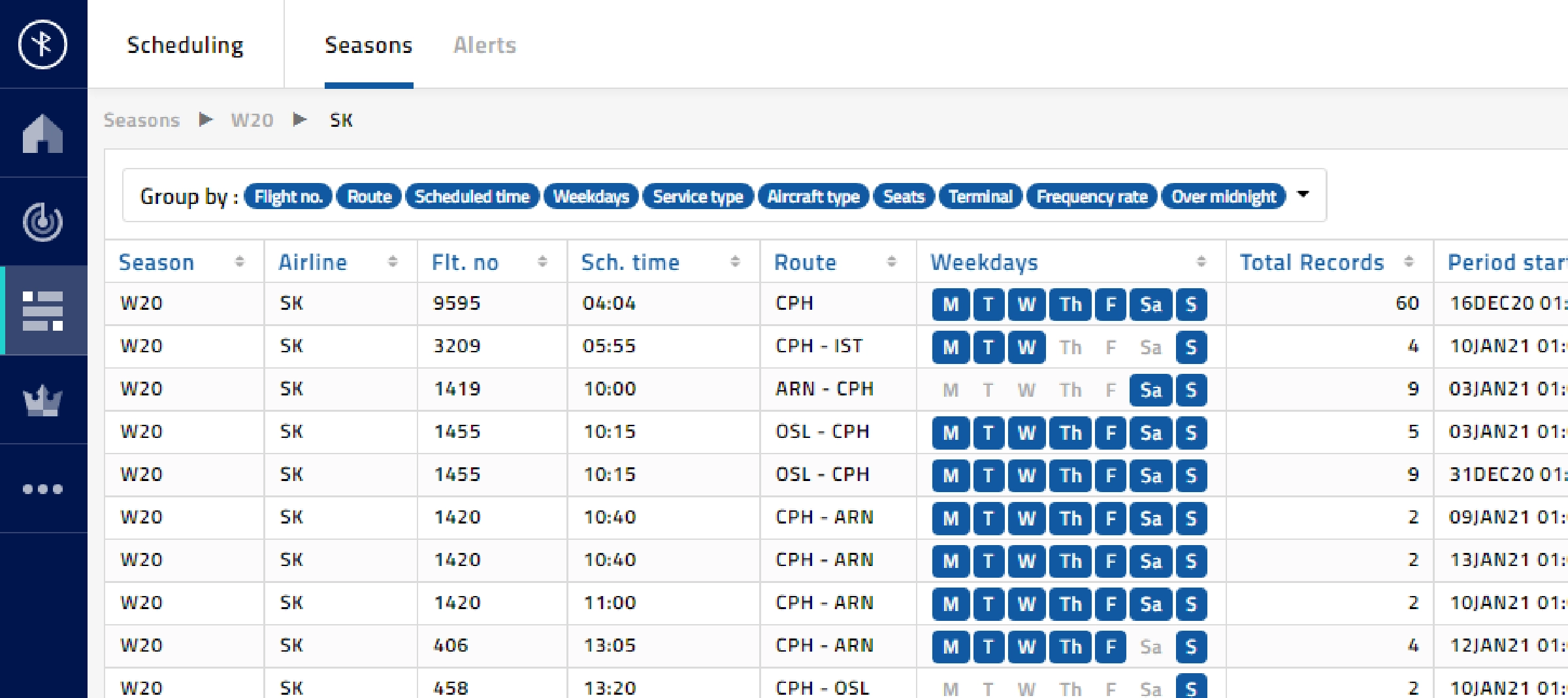
-
Benefits
The Flight Schedule Management module provides business value from day one by:
- A single source of truth regarding future schedules.
- Minimise back-office administration through automatic data capture.
- Plan ahead, reduce risks and make better business and operational decisions.
- Strengthen seasonal resource allocation and bottleneck detection.
- Improve control and management efficiency in airport operations, Using "what if" scenario simulations for operational flight planning, scheduling, and management processes.
- Better predictability and turnaround efficiency for the airport and improved customer satisfaction.
-
Future Perspectives
The Flight Schedule Management module is developed continuously, with new
features added in each development cycle.
The Schedule Maturity Score is one such feature. Based
on an AI predicted maturity score, the system can automatically and continuously activate flight records
allowing for early planning.
When the planning process for a new season begins, airports
continuously receive schedule entries – as the process proceeds, the plan is updated regularly with changes,
additions, and cancellations. Only once the plan stabilises it can be activated, because once it is
activated, airport operations are planned according to the capacity required based on the activated
plan.
Activating a high-quality seasonal plan, as early as possible, is a strong advantage for
airports — allowing them to plan operations ahead of time. However, before activating a plan, the airport
must determine if the plan is mature enough for activation. A plan is considered mature once data is
reliable. This is where the AIRHART Schedule Maturity Score comes in.
The AIRHART system
calculates a “maturity score” for each entry, indicating how reliable the data entries are. The score is
calculated using artificial intelligence (AI) based on a combination of different parameters and data
sources. For example:
- Historic data – It is likely that a plan is reliable once it is relatively similar to previous seasons.
- Update frequency – It is likely that the plan is reliable once the frequency of updates is low and stabilised.
The score is expressed as a percentage and can be aggregated on route, airline and overall season level too.
Custom Data Management
The bi-temporal Custom Data Management module gives unique access to the building blocks of Core
Operational Asset Data and allows the user to extend the data structure. This includes minor changes —
like adding more properties on aircraft types — and larger ones, like creating entirely new data types.
The module gives full control to the flexible part of the data structure and allows for modifications to
data and thereby also the use of data, both directly and by other modules, for flight record enrichment
for example.
Data is handled bi-temporally, as well as flexibly. All data is automatically
enhanced with a start and an end time/date, making it possible for the user to specify validity periods
and control the use of data over time, while the system automatically ensures correct and valid
relations between datasets.
For utmost management and control, platform administrators can
layer an approval process on all data changes. This means no change will take place without being
approved.
-
Key Functionality
- Specify start and end times/dates on all data, and concurrently apply different values to different periods.
- Adapt the data structure as needed, thanks to AIRHART’s dynamic data model
- Distribute data model changes to all stakeholders, automatically.
- Support for data change approvals.
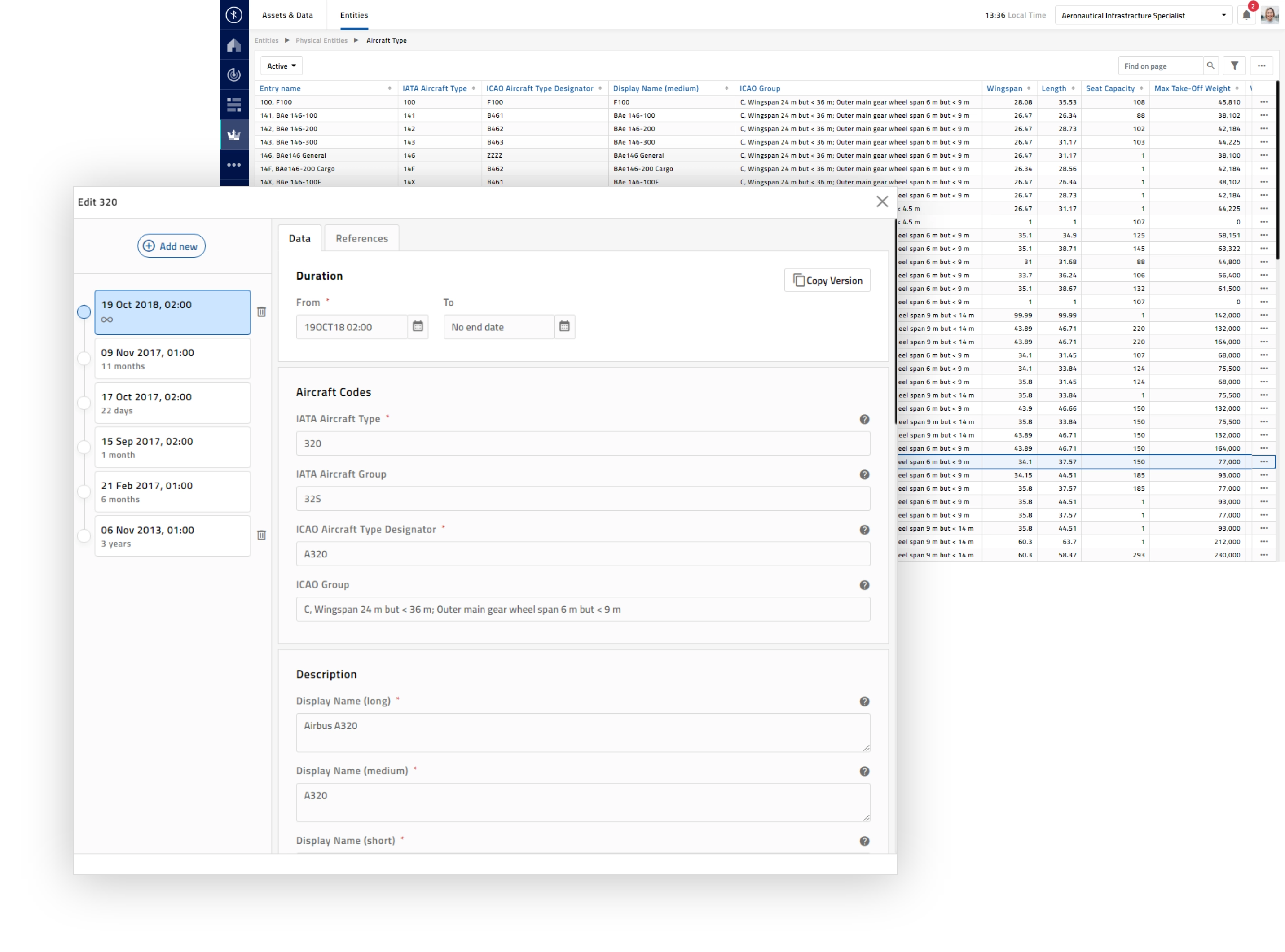
-
Benefits
- Validity periods allow for preparation of future data – and correction of historical data.
- Validity periods together with registration times allow for full historical insight.
- The data structure can be changed by the end-user using business insight and without technical (and costly) involvement.
Compatible and Accessible
The AIRHART platform is highly flexible and integrates easily to existing systems or 3rd parties. AIRHART uses open and well-documented APIs as connectors because we truly believe in openness and the ethos that we are smarter, together.
Reach out to us if you want to know more about integrating AIRHART.
Insights
Data is key to making intelligent, fact-based decisions — both in response to real-time events and when
trying to optimise total airport management for the long haul.
The AIRHART Insights
component is powered by a unified analytics engine for large-scale data processing. With it, airports
unlock benefits from more accurate forecasting to increased operational efficiency, passenger experience
and unlocking commercial potential.
Insights ties the platform together across core features,
modules, and custom elements. Data-driven insights enable optimisation, prediction, and recommendations.
As a result, the Insights component provides the basis for a learning system that continuously improves
itself.
AIRHART Insights provides an operational point of reference across all airport
stakeholders while ensuring easy access to data – a single source of truth.

-
Key Functionality
The Insights component is a powerful data processing engine that collects, transforms, and stores large amounts of real-time data, both structured and unstructured, to provide business-critical insights to relevant stakeholders across the Smarter Airports ecosystem.
- Collect, process, aggregate and expose data as it is generated.
- Consume both streaming and batch data sources, as well as multiple data formats.
- Give BI analysts and data scientists the tools they need to query relevant information, via a sophisticated analytics UI, pulling real-time data and historic data for analysis.
- Process dynamic data structures through automatic schema recognition.
- Push airport data to multiple external clients, using a varied set of outbound adapters — including real-time, subscription-based data feeds for consumers who require live data updates.
- Enjoy long-term data storage as standard — facilitating historical reporting, time-based analysis and raw message inspection with ease.
- Make use of operationalised machine learning models; turning statistical engines into software components, to power other areas of the solution.
-
Benefits
The data Insights component gives the speed, power and flexibility needed to draw timely insights from massive amounts of highly varied airport data.
- Real-time big data access to conduct meaningful data analytics, visualisation, and discovery.
- Unified data perspective across the ecosystem.
- Flight delay predictions using advanced machine learning models.
- Data-driven suggestions for continuous improvement — based on insights collected across the ecosystem and delivered via AIRHART's intelligent machine learning model.
- Cross-airport benchmarks to find the best performers, understand their processes and implement them throughout other airports in the Smarter Airports eco-system.
“The AIRHART insights engine ensures that we take business critical decisions based on reliable data and insights.”
